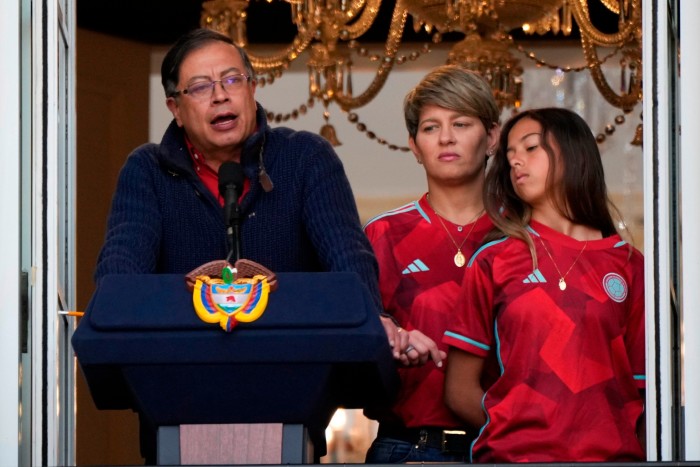Colombia’s president was every inch the revolutionary. From the balcony of the presidential palace last week, Gustavo Petro denounced “neoliberalism” for causing war, Covid-19, hunger and the climate crisis. He railed against businesspeople whom he said were plotting to frustrate his reforms.
Then he addressed the crowd below: “The moment has come to rise up: the president is inviting his people to rise up, not to kneel, to become the masses who know they have the future in their hands.”
Six months into his presidency, Colombia’s first leftwing president is casting aside the mantle of moderation he had assumed in last year’s election campaign and reviving the revolutionary rhetoric of his youth as a member of an urban guerrilla group.
Petro is betting that he can mobilise his army of supporters to help push through radical plans to expand the state’s role in pensions, health and the labour market.
Investors wonder how Petro will fund his expensive campaign pledges when a bloated budget deficit, persistent inflation and a high current account deficit are already a concern. Congress is expected to approve a budget law that would raise spending by an additional $5.1bn this year.
At stake is the future of what was one of South America’s most reliably conservative states, popular with investors for its prudent economic polices and prized by Washington as its closest military ally in the region.
Some of those close to Petro insist that the administration will be pragmatic, more akin to European social democracy than to firebrand Latin American leftwingers such as former Venezuelan leader Hugo Chávez.
“This is not a government which is going to bury all the institutions and end the market economy,” said senator Iván Cepeda, leader of a leftwing party that is part of Petro’s Historic Pact coalition. “Quite the opposite: it’s a very moderate government, but also one with a clear orientation towards change and reform.”
Far from creating turmoil, Cepeda argued, Petro had brought stability to one of the world’s most unequal countries by building a coalition for long-overdue change.

“Reforms don’t happen in any society without turbulence,” he said. “But the government has managed something unthinkable: a peaceful step in Colombia from a traditional government of the elites to a progressive government.”
Since Petro took power last August, the big demonstrations that had punctuated the government of his unpopular centre-right predecessor Iván Duque have ended: many of the protest organisers are now in power.
Petro raised eyebrows by comparing an international court’s verdict that Colombia was responsible for the “systematic extermination” of more than 6,000 leftwing activists in past decades to the Nazi murder of 6mn Jews. “Nazi Germany had a genocidal state,” Petro said. “There is no difference between the Colombian state and the Nazi state from that point of view. They are genocidal.”
His vice-president Francia Márquez, an environmental activist from Colombia’s marginalised Pacific coast black community, recently visited Cuba to “build alliances around common objectives”.
Criticism has been muted, at least in public: most of congress has been co-opted. “Everyone is giving him the benefit of the doubt,” said Paca Zuleta from Bogotá’s University of the Andes. “Nobody is providing real opposition.”
Outside Colombia, some are more forthright. Débora Reyna at Oxford Economics believes the government risks a “nasty recession” this year if it does not change course. “Petro has compounded the risks of policy mismanagement at a time of deteriorating fundamentals,” she said in a note.
Colombia was Latin America’s fastest growing big economy last year, with gross domestic product expanding 7.5 per cent, but this year the government forecasts 1.2 per cent growth while Capital Economics predicts only 0.8 per cent.
Investment into oil, gas and mining — sectors that together make up more than half of Colombia’s export earnings — is uncertain following mixed signals from the government over new exploration. The peso has fallen about 18 per cent over the past year, making it one of the weakest emerging market currencies.
Yet business leaders prefer not to antagonise the president. Instead they lobby privately and hope that a moderate faction, which includes finance minister José Antonio Ocampo and education minister Alejandro Gaviria, will act as a brake on Petro.
Ocampo successfully launched a tax reform last November, which increased levies on wealthier Colombians and on oil and mining. The plan was praised for raising revenues without destroying competitiveness.
As Petro pursues more controversial reforms, finding such compromise is proving harder. Gaviria, a former health minister, had asked Petro to modify plans to nationalise most of Colombia’s health system but he was rebuffed. “The original proposal didn’t change much and we didn’t achieve a responsible reform,” Gaviria said.
Colombia has one of the best resourced public health systems in the Americas, financed mostly by compulsory insurance. Petro plans to largely eliminate the private intermediaries that run the system, widen coverage and hand control to the state. The government estimates that the extra costs could amount to 3.5 per cent of GDP— double the amount raised in last year’s tax reform, according to Capital Economics.
Next on Petro’s list is pensions. He has yet to publish draft legislation but took aim last Tuesday at two unnamed bankers, saying they had enriched themselves at the expense of workers.
“These two bankers are loaded with money,” he said. “Eighteen million [contributors] are giving money every month to the two biggest banks while nobody receives a pension.”
It is unclear whether Petro’s popularity will sustain him amid a slowing economy. His appeal last week for a mass rally to support his reforms backfired. Only a few thousand came out in Bogotá, while a counter-demonstration the following day was much bigger.
Some have raised doubts about Petro’s ability to deliver, saying he is stronger as a campaigner than an executor.
“Petro is a revolutionary who has left a lot of inconclusive revolutions,” said Juanita León, editor of politics website La Silla Vacía.
“He wants to change many things through force of will, but he has not demonstrated so far that he has the capacity to take the necessary steps to replace them with something new.”


























































![Mason Ramsey – Twang [Official Music Video] Mason Ramsey – Twang [Official Music Video]](https://i.ytimg.com/vi/xwe8F_AhLY0/maxresdefault.jpg)




















